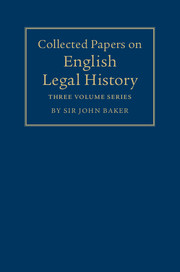Book contents
- Collected Papers on English Legal History: Volume I
- Contents
- List of Illustrations
- Acknowledments
- List of Abbreviations
- Introduction
- PART I The Legal Profession
- PART II The Inns of Court and Chancery
- PART III Legal Education
- PART IV Courts and Jurisdictions
- Collected Papers on English Legal History: Volume II
- Contents
- PART V Legal Literature
- 29 The Three Languages of the Common Law
- 30 Case-Law in Medieval England
- 31 Dr Thomas Fastolf and the History of Law Reporting
- 32 John Bryt's Reports and the Year Books of Henry IV
- 33 Case-Law in England and Continental Europe
- 34 The Books of the Common Law 1400–1557
- 35 English Law Books and Legal Publishing 1557–1695
- 36 Books of Entries
- 37 Manuscripts in the Inner Temple
- 38 Common Lawyers' Libraries 1450–1650
- 39 John Rastell and the Terms of the Law
- 40 Coke's Notebooks and the Sources of his Reports
- 41 John Selden and English Legal History
- 42 The Newe Littleton
- 43 Sir Thomas Robinson's Notebooks
- PART VI Legal Antiquities
- PART VII Public Law and Individual Status
- PART VIII Criminal Justice
- Collected Papers on English Legal History: Volume III
- Contents
- PART IX Private Law
- PART X General
- Bibliography of the Published Works of Sir John Baker
- Index
30 - Case-Law in Medieval England
from PART V - Legal Literature
Published online by Cambridge University Press: 05 December 2014
- Collected Papers on English Legal History: Volume I
- Contents
- List of Illustrations
- Acknowledments
- List of Abbreviations
- Introduction
- PART I The Legal Profession
- PART II The Inns of Court and Chancery
- PART III Legal Education
- PART IV Courts and Jurisdictions
- Collected Papers on English Legal History: Volume II
- Contents
- PART V Legal Literature
- 29 The Three Languages of the Common Law
- 30 Case-Law in Medieval England
- 31 Dr Thomas Fastolf and the History of Law Reporting
- 32 John Bryt's Reports and the Year Books of Henry IV
- 33 Case-Law in England and Continental Europe
- 34 The Books of the Common Law 1400–1557
- 35 English Law Books and Legal Publishing 1557–1695
- 36 Books of Entries
- 37 Manuscripts in the Inner Temple
- 38 Common Lawyers' Libraries 1450–1650
- 39 John Rastell and the Terms of the Law
- 40 Coke's Notebooks and the Sources of his Reports
- 41 John Selden and English Legal History
- 42 The Newe Littleton
- 43 Sir Thomas Robinson's Notebooks
- PART VI Legal Antiquities
- PART VII Public Law and Individual Status
- PART VIII Criminal Justice
- Collected Papers on English Legal History: Volume III
- Contents
- PART IX Private Law
- PART X General
- Bibliography of the Published Works of Sir John Baker
- Index
Summary
Although the common law of England began to achieve a distinct identity before the English courts started to keep records, dependence on precedent seems always to have been one of its features. The common law described in Glanvill in the 1180s was conceived of chiefly in terms of remedies, and those remedies – enshrined in the ‘writs’ which commenced actions – were the results of decisions which were rigidly adhered to. Whether such decisions to introduce new remedies should be considered judicial or legislative, or even administrative, is a question ahead of the time to which it relates. But there seems to have been an understanding, at least by Glanvill's time, that once a form of remedy was established it was not easily to be changed. Although there was some initial experimentation, the Chancery would not generally issue writs in new forms; and the courts would not generally accept them if they did. There was some scope for innovation, particularly through actions on the case, but the importance of precedent in the writ system remained a feature of English law until the nineteenth century. However, the wording of writs constitutes only a very rudimentary kind of precedent. The writs were necessary preliminaries to judicial proceedings, and as such provided a framework for legal analysis; but they did not themselves contain propositions of law or indicate in detail what kinds of case fell within their scope.
- Type
- Chapter
- Information
- Collected Papers on English Legal History , pp. 547 - 578Publisher: Cambridge University PressPrint publication year: 2013



